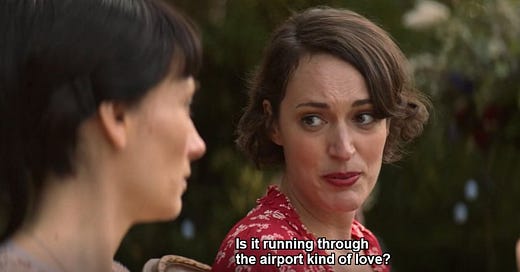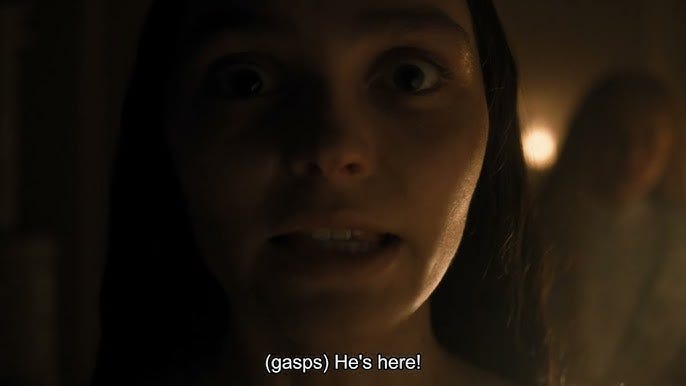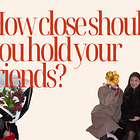Don't look too closely, love
On a scale of "I'd-die-for-you romance" to "Hinge makes me feel spiritually ran through", what is your outlook on love?
When two people relate to each other authentically and humanly, God is the electricity that surges between them.
—Martin Buber
There was a time when love was dumb and beautiful. It held prolonged eye contact across a crowded room. It happened while you were stuck beside them on a five-hour flight. It didn’t consult your preferences. It was the preference, indescribable and inconvenient, the way rain prefers to pour on the day you forget your umbrella.
Information (too much, too soon) deletes Eros, the spirit of love. Romance requires a blurriness, be it distance or the veil of naivety. We all want serendipity, but meet cutes don’t happen on the apps, matchmaking services, or anything else that starts with data because Eros doesn’t like being seen—this is what happens in the Greek myth: when Psyche lifts a lamp to look at her lover’s face while he sleeps, they are split up and she is cursed to never see him again.
We didn’t want to kill Eros, we just wanted to know what he means. So, we asked too many questions. We looked too closely, picked him apart, and called it a trend, an aesthetic, an accessory. We plotted attraction on memes and organized them on rosters and forgot how to feel it.
Outsourcing Eros to software
Algorithms are good at connecting people with mutual interests, political alignment, attachment style, and music taste. It’s calibrated for safety, similarity, compatibility, and even outcome…but we all agree that it’s missing the feeling of desire. The gaze of wanting. The I-can’t-look-away. I know this feeling because I feel it every time I see the waiter bring plates to my table.
I once matched with a guy who, in our very first conversation, asked me to go to Tokyo with him for our first date. The chances of that happening without dating apps are near zero. In a way, dating apps let you find your value by operating in an open market, but you’ll forever feel like you were picked from a pile, that you should shut up and feel content for winning some kind of numbers game because you had no chance otherwise anyway (maybe I am a h̷o̷p̷e̷l̷e̷s̷s̷ incurable romantic).
Another thing about the algorithm is that it prefers certainty, and I am down bad for mystery. The irony is that even when you’re being serious and intentional, marking yourself as “serious and intentional” ruins that unspoken something-something. Alternatively, if you don’t explicitly say what you’re looking for: (for men) you’re more likely to be ignored because someone else’s profile provides more certainty, or (for women) you’re more likely to attract people who will ruin your life. Damned if you do, damned if you don’t.
Due diligence weakens Eros. The minute someone asks “What are you looking for?”, “What have your experiences been like on Hinge?”, or “What were your past relationships like?” Eros is gone. I’m not saying ignorance is good or that we shouldn’t vet people, it’s that when we try to categorize living humans into some kind of type (“sensitive young man”, “crypto bro”, “golden retriever”, “black cat”, “Pilates princess”), the connection loses its soul, almost like how you kill a good joke by explaining it.
I don’t think dating apps are bad, even though I empathize with the “optionality makes you numb” sentiment. However, the issue here isn’t even about putting your eggs in different baskets, it’s DO YOU EVEN LIKE YOUR BASKETS??? (see:
talks about #ihatemybf)Romantic perfectionism vs. True desire
The poet Anne Carson once wrote about how Eros can lead to humiliation because it’s a slap in the face to anyone who wants control and permanence around something naturally incontrollable and elusive.
Humiliation and rejection hurt. Yearning aches. Embarrassment can last longer in memory than physical injuries do on the body. One of the major reasons people use dating apps is because it reduces that pain. We get binary responses (i.e., match/no match, reply/no reply). When we strive for romantic perfectionism, we make desire a problem when it was supposed to be the point. Eros needs nuance.
When we outsource Eros to software—when we tell it “Here’s my type, my hobbies, my icks, and my love languages; bring me someone I won’t suffer for,” it becomes the worst kind of god: one that gives us exactly what we ask for. True desire doesn’t obey. True desire comes uninvited. We need more Pride and Prejudice and less Terms and Conditions. So, even when there are plenty of fish in the sea, we feel lonely—not because we can’t find someone, but because we never get to fall. One doesn’t climb into love, one falls into it. Falling is irrational. It defies taste and reason. That’s why it feels like losing control.
In Desire is Dead,
says that Eros is supposed to be brutal: “it’s debilitating, devastating, overwhelming—even if it is one of the greatest driving motivations for humans. Why? Because at the heart of desire is wanting something you do not have.” In Greek myth, Eros travels between Mt. Olympus and our world, forming couples between gods and mortals, because it’s only a love story when one party is capable of dying and leaving the other utterly broken. Eros and death are linked: Italian literature frequently plays with the words amore, love, and morte, death, and it’s also why love stories where one person dies (Titanic, Romeo and Juliette) are so archetypal.We say we want love—and we do—but we forgot that love is totally irrational, and there’s no room for the irrational when everything is optimized or curated. Sometimes, love is what shouldn’t work: that off-script, strange interaction that, in hindsight, was poetry, but you failed to see it that way in the moment because you were fixed on the practical configuration. Eros thrives in what’s unpredictable: in misdialed calls, in the confusion between ‘a friend’ and ‘a crush’, in not knowing. Butterflies don’t hatch from the quantifiable percentage of similarity.
Emily Dickinson said, “the heart wants what it wants, or else it does not care.” My version is: “If I don’t feel like breaking rules or making exceptions for him…maybe I don’t like him that much.” (🤪)
When we ask to be understood too desperately, we lose the pleasure of misunderstanding: Transparency is also boredom. Calculated compatibility is also polite staleness. Fire needs friction. Eros hides his face.
How can there be intimacy without vertigo? How can there be a story without mystery and the risk of death? Desire doesn’t want to be understood, it wants to be felt. Do you want to be correct or do you want to be enchanted?
I didn’t take Tokyo up on his offer. A gut instinct told me not to.
xx











What is love? From the insights of Children:
A group of professionals posed this question to a group of 4 to 8 year-olds, "What does love mean?" The answers they got were broader and deeper than anyone could have imagined. See what you think:
"When my grandmother got arthritis, she couldn't bend over and paint her toenails anymore. So my grandfather does it for her all the time, even when his hands got arthritis too. That's love." Rebecca - age 8
"When someone loves you, the way they say your name is different. You just know that your name is safe in their mouth." Billy - age 4
"Love is when a girl puts on perfume and a boy puts on shaving cologne and they go out and snuggle together." Karl - age 5
"Love is when you go out to eat and give somebody most of your French fries without making them give you any of theirs." Chrissy - age 6
"Love is what makes you smile when you're tired." Terri - age 4
"Love is when my mommy makes coffee for my daddy and she takes a sip before giving it to him to make sure the taste is OK." Danny - age 7
"Love is when you kiss all the time. Then when you get tired of kissing, you still want to be together and you talk more. My Mommy and Daddy are like that." Emily - age 8
"Love is what's in the room with you at Christmas if you stop opening presents and listen,". Bobby - age 7
"If you want to learn to love better, you should start with a friend whom you hate." Nikka - age 6
"Love is when you tell a guy you like his shirt, and he then wears it every day." Noelle - age 7
"Love is like a little old woman and a little old man who are still friends even after they know each other so well." Tommy - age 6
"During my piano recital, I was on a stage and I was scared. I looked at all the people watching me and saw my daddy waving and smiling. He was the only one doing that. I wasn't scared anymore." Cindy - age 8
"My mommy loves me more than anybody. You don't see anyone else kissing me to sleep at night." Clare - age 6
"Love is when Mommy gives Daddy the best piece of chicken." Elaine - age 5
"Love is when Mommy sees Daddy smelly and sweaty and still says he is handsomer than Robert Redford." Chris - age 7
"Love is when your puppy licks your face even after you left him alone all day." Mary Ann - age 4
"I know my older sister loves me because she gives me all her old clothes and has to go out and buy new ones." Lauren - age 4
"When you love somebody, your eyelashes go up and down and little stars come out of you." Karen - age 7
"You really shouldn't say 'I love you' unless you mean it. But if you mean it, you should say it a lot. People forget." Jessica - age 8
And the final one:
Author and lecturer Leo Buscaglia once talked about a contest he was asked to judge. The purpose of the contest was to find the most caring child. The winner was a four-year-old child whose next-door neighbor was an elderly gentleman who had recently lost his wife. Upon seeing the man cry, the little boy went into the old gentleman's yard, climbed onto his lap, and just sat there. When his mother asked him what he had said to the neighbor, the little boy said:
"Nothing, I just helped him cry."
https://substack.com/@tritorch/note/c-110313722
As it turns out, by training a magnifying glass on Eros, we didn't see him better or learn anything new. We just burned him alive.